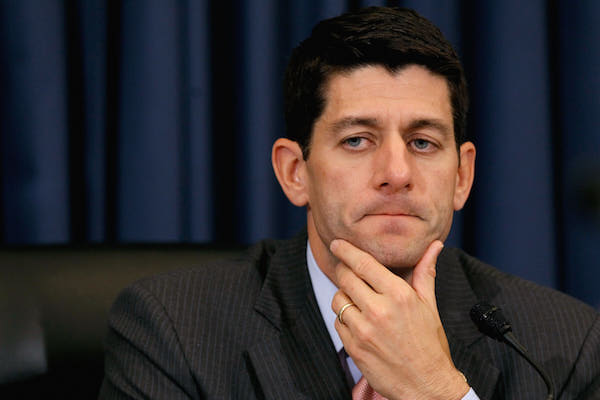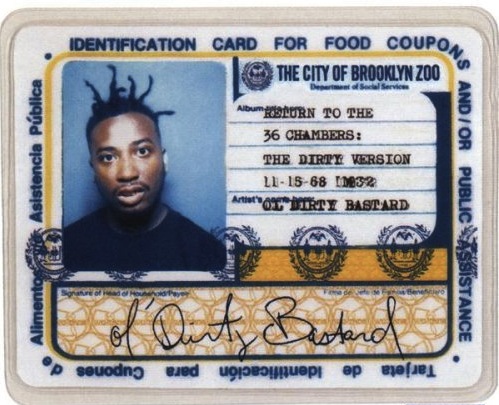Is there anything more satisfying than hard work? Can any force build a stronger character than honest labor daily undertaken? Work nourishes the soul—not my soul, of course, but the souls of others. In these times of national struggle, the only clear way forward is for other people to roll up their sleeves, take hold of their bootstraps and, with whatever hands remain available, get to work. I am prepared to do whatever it takes to teach other people the value of work, whether that means opposing welfare or cutting my own taxes. Today is Friday, and honest labor sets everyone free except me. Won’t you rediscover the joys of work by yourself?
Tag Archives: medicaid
GOP issues “moral document” in the form of 10-year budget plan

Rep. Paul Ryan (R–WI) pretends to think about your birthday present, but you’re getting an iTunes gift card.
If you want to feel superior and depressed at the same time, read this New York Times story on the budget plan House Republicans submitted last week. The good news is that it balances the federal budget by 2025. The bad news is that it does so by assuming $147 billion in additional revenue from the “macroeconomic effect” of the budget itself. It also repeals the Affordable Care Act and the taxes that support it, but still includes $1 trillion in revenue from those taxes. Finally, it counts $1 trillion in savings from unspecified cuts to social welfare programs. Don’t worry, though: there’s a $40 billion increase in defense spending next year, couched as “emergency war spending” so as not to violate the 2011 Budget Control Act. We’ll find the war later. As Rep. Rob Woodall (R–GA) of the House Budget Committee put it, “A budget is a moral document; it talks about where your values are.”
MT rejects federally-funded Medicaid expansion, possibly by accident
The 2013 session of the Montana state legislature ended last week, and now the state House and Senate will slumber until 2015. Legislators in Montana meet for 87 days every two years, which means that A) there’s a lot of pressure to get everything done and B) not everybody has had a ton of practice. The second phenomenon became evident earlier this month, when Rep. Tom Jacobson (D–Great Falls) accidentally voted the wrong way on a parliamentary objection, causing a tie in the House that allowed Speaker Mark Blasdel to reject federal funding for Medicaid expansion under the Affordable Care Act.
Nebraska bill would make drug tests a condition of welfare
Alert reader Zach Sanderson sent me this article describing a proposal in the Nebraska legislature to tie welfare benefits to drug testing. Introduced by Senator Charlie Janssen of Fremont—population 26,000—the bill would require new applicants and current recipients of public assistance to submit to random tests, as authorized by the 1990 congressional overhaul of the federal welfare system. “When a taxpayer gives assistance to somebody, it’s assistance so they can get back up on their feet,” Janssen told ABC. “It’s kind of a slap in the face to the taxpayers when they say, ‘We’re going to get up on our feet while we’re doing drugs.'” Janssen makes a good point, whose incisiveness is dulled only slightly by its being echoed from every barstool in the country during tax season. In 2006, Nebraska spent just over $2 billion on welfare—which includes food stamps, housing assistance and Medicaid, but not, somehow, Medicare, college scholarships or farm subsidies—to support 320,000 recipients.*  Surely, some of those people are wasting taxpayers’ hard-earned money. Unfortunately, administering drug tests to all of them—at an average rate of $42 per test, according to the Department of Education—would cost the state $13.4 million, and that’s just to do it once. Janssen himself admits that the costs of testing would, at least in the short term, make his plan unworkable. “This is part of our budget woes…paying people who aren’t truly trying to rehabilitate themselves and get off the state welfare system,” he said. “But the short-term cost right now is probably going to be overwhelming.” Which raises an interesting question: what, exactly, do we spend money on welfare for?
Surely, some of those people are wasting taxpayers’ hard-earned money. Unfortunately, administering drug tests to all of them—at an average rate of $42 per test, according to the Department of Education—would cost the state $13.4 million, and that’s just to do it once. Janssen himself admits that the costs of testing would, at least in the short term, make his plan unworkable. “This is part of our budget woes…paying people who aren’t truly trying to rehabilitate themselves and get off the state welfare system,” he said. “But the short-term cost right now is probably going to be overwhelming.” Which raises an interesting question: what, exactly, do we spend money on welfare for?



